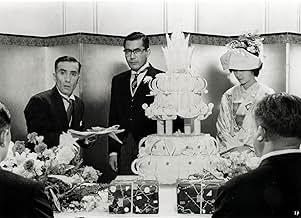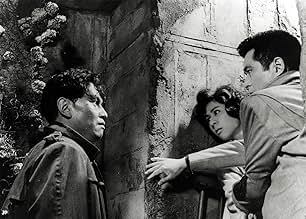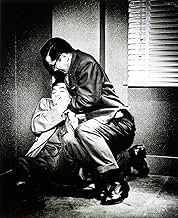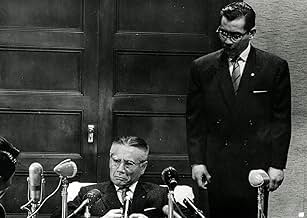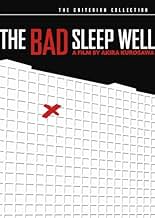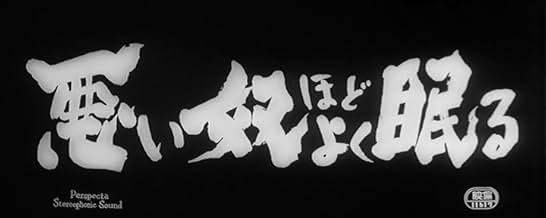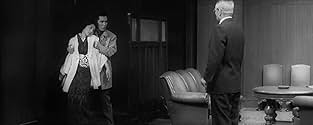NOTE IMDb
8,0/10
15 k
MA NOTE
Ajouter une intrigue dans votre langueA vengeful young man marries the daughter of a corrupt industrialist in order to seek justice for his father's suicide.A vengeful young man marries the daughter of a corrupt industrialist in order to seek justice for his father's suicide.A vengeful young man marries the daughter of a corrupt industrialist in order to seek justice for his father's suicide.
- Réalisation
- Scénario
- Casting principal
- Récompenses
- 3 victoires et 1 nomination au total
Avis à la une
I just watched "The Bad Sleep Well," and finished reading the other viewers comments. So I will comment on both. "Seven Samurai" is perhaps my favorite film of all time, and I really like Kurasawa's work. Other than the brief plot summary, I didn't really know what to expect from "The Bad Sleep Well." The beginning can be somewhat confusing, as the reporters throw out lots of Japanese names and the viewer must struggle to understand what's going on and who is who. But as the film progressed, I found myself drawn in and completely absorbed by it. Don't worry if you don't get it at first, all will become clear. I found this to be an excellent film, and I would recommend it to any Kurasawa film. Sure, it's not action-packed like his samurai films. And yes, it is somewhat slow in pace. But I must say that I didn't really mind that. I found it quite engrossing. There are enough plot twists and turns to keep the viewer interested. I din't think that Toshiro Mifune did a bad job either, as some other viewers thought. He's not wild and crazy like in "Seven Samurai" or "Rashomon" but I didn't think he was badly cast. Sadly, I am not intimately familiar with "Hamlet," so I can't comment too much on the similarities. It seems to be the general opinion that this "The Bad Sleep Well" is loosely based on Hamlet, but I also agree that this won't detract from your enjoyment of the film in any way, and that knowing "Hamlet" doesn't mean that you will know what happens in this film. I agree with those who say that this is another underrated Kurarsawa masterpiece, and well worth seeing. Give it a chance!
At the start of this film I didn't know what to expect. I thought it might be a mediocre Kurosawa film. By the end of the film I realized it was one of his best. This film about familial discord and corporate manipulation is breathtaking. Its filled with irony, double crosses, cynicism, manipulation and revenge. In short, its endlessly interesting and captivating. Definitly a must see.
Akira Kurosawa's "The Bad Sleep Well" is too dense and frankly too slow a film to qualify as a thriller in the usual sense. Although the elements are there - intrigue, double crosses, revenge, and crimes both naked and invisible - the pacing is too deliberate and there is little real suspense.
Yes, it's "Hamlet," though in a subtle, understated, Japanese way. Some of the characters are left out, but you'll eventually spot the Prince, Horatio, Ophelia, and Claudius. However, unlike his "Macbeth" ("Throne of Blood"), this is only a partial transposition and Kurosawa wisely does not carry the parallels too far.
Although it takes patience, the picture has its rewards. The performances are good, especially Masayuki Mori as the reptilian manipulator Iwabuchi, Kamatari Fujiwara as the hapless accountant Wada, and, as always, Takashi Shimura as master bureaucrat Moriyama. The sharp black-and-white cinematography gives the film a photo-journal aura of authenticity. And Masaru Sato's wonderful opening theme, heavy with menace and unease, certainly sets an appropriate tone.
Toshiro Mifune as Nishi/Hamlet is unusually restrained here, his normal fire largely internalized. He's adequate, but this casting against type doesn't really suit him.
"The Bad Sleep Well" is Kurosawa's attack on Japan's post-war business corruption that apparently was endemic by 1960 and perhaps still is today. His critique is harsh and unsparing, though one can't help but get the feeling that he's shooting at fish in a barrel.
Beyond the corruption of the corporate scandal, which the film literally headlines, is a strong sense of inner decay. Nearly everyone, regardless of their position, is uncomfortable. Even Iwabuchi, for all his power, must answer awkwardly to greater, unseen forces. Only the jackal-journalists who cover the opening wedding banquet seem immune to the pervasive uneasiness.
Yet all, save Nishi, are prepared to accept this state of affairs in return for their security. Ironically, Nishi himself seems most comfortable in an old air raid shelter in the ruins of a munitions plant, his own "castle", as it were, where he fights for honor as he understands it.
Recommended for Kurosawa fans and anyone interested in Japanese psyche, culture, or style. Those expecting a slam-bang 1940s Warner Brothers treatment will be extremely disappointed and probably won't last an hour.
Yes, it's "Hamlet," though in a subtle, understated, Japanese way. Some of the characters are left out, but you'll eventually spot the Prince, Horatio, Ophelia, and Claudius. However, unlike his "Macbeth" ("Throne of Blood"), this is only a partial transposition and Kurosawa wisely does not carry the parallels too far.
Although it takes patience, the picture has its rewards. The performances are good, especially Masayuki Mori as the reptilian manipulator Iwabuchi, Kamatari Fujiwara as the hapless accountant Wada, and, as always, Takashi Shimura as master bureaucrat Moriyama. The sharp black-and-white cinematography gives the film a photo-journal aura of authenticity. And Masaru Sato's wonderful opening theme, heavy with menace and unease, certainly sets an appropriate tone.
Toshiro Mifune as Nishi/Hamlet is unusually restrained here, his normal fire largely internalized. He's adequate, but this casting against type doesn't really suit him.
"The Bad Sleep Well" is Kurosawa's attack on Japan's post-war business corruption that apparently was endemic by 1960 and perhaps still is today. His critique is harsh and unsparing, though one can't help but get the feeling that he's shooting at fish in a barrel.
Beyond the corruption of the corporate scandal, which the film literally headlines, is a strong sense of inner decay. Nearly everyone, regardless of their position, is uncomfortable. Even Iwabuchi, for all his power, must answer awkwardly to greater, unseen forces. Only the jackal-journalists who cover the opening wedding banquet seem immune to the pervasive uneasiness.
Yet all, save Nishi, are prepared to accept this state of affairs in return for their security. Ironically, Nishi himself seems most comfortable in an old air raid shelter in the ruins of a munitions plant, his own "castle", as it were, where he fights for honor as he understands it.
Recommended for Kurosawa fans and anyone interested in Japanese psyche, culture, or style. Those expecting a slam-bang 1940s Warner Brothers treatment will be extremely disappointed and probably won't last an hour.
For his first film made by his own independent production company, Kurosawa decided to take advantage of his new creative freedom to make his most politically daring picture to date. He takes on the corruption rife in corporate Japan in a film noir of almost epic proportions.
This was Kurosawa's most stylised film so far. He takes a nasty, tragic film noir plot-line (and yes, there are elements of Hamlet, but not enough to call it an adaptation) but plays it at some times as if it was a farcical comedy, and at others like it was a horror. The villainous characters appear slightly ridiculous and even cartoonish. Only the most senior amongst them, Iwabuchi, is allowed to keep his dignity. While the others are just puffed-up minions, easily toppled, Iwabuchi seems truly immovable.
The establishing scenes are the film's strongest. It opens, like The Godfather, with a lengthy wedding scene which serves to introduce all the principle characters and set the tone. Everything about the way this scene is put together tells us this is not the happy occasion it should be the hall where the ceremony takes place echoes off-puttingly, a company official about to make a speech cringes as champagne corks go off behind him like gun shots. Add to this an interruption from the police, a gang of journalists and photographers waiting in the wings, and a best man's speech that turns from jokes to threats, and you can practically taste the corruption and decadence that is the focus for this story.
The wedding scene is followed by a montage of newspaper headlines and newsreel footage, reminiscent of similar devices used by Frank Capra and Raoul Walsh. Kurosawa brilliantly choreographs this sequence to music, a rather eerie little dirge more typical of a Japanese period piece than a modern thriller. It's the only example of this kind of montage I know of in Kurosawa's work (it was rare for him to expand the narrative to the bigger picture), but it's a highly effective one-off.
The central plot, of Nishi (Toshiro Mifune) orchestrating spectacular revenge against the men who killed his father, is full of amazing set-pieces. There are echoes of Hitchcock in the way Kurosawa shoves significant objects right up to the camera. The use of music is dazzling, combining upbeat music with unnerving moments to give a great sense of irony. Nishi is the last person the villains suspect, and he often appears innocently in the background with little more significance than an extra, although of course the audience knows better. It's a nice touch that Kurosawa has the character wear glasses, making Mifune almost unrecognisable to us as well.
Sadly, the film's pace slows down after the first hour, and rarely gets back to the same dizzying heights for the rest of its 145 minutes. The lengthy runtime does however allow Kurosawa to add a depth that is absent from your average 100-minute Hollywood Film Noir. Kurosawa could be bleak, but he never forgot the humanity in his films, and this is really the focus in the second half of the film. He takes time to put the spotlight on the innocent victims of revenge (Nishi's wife, Wada's family), and even show the arch-villain in moments of warmth and tenderness with his family. And this is perhaps where the story's biggest similarity with Hamlet is Nishi's revenge falls apart because he is unable to be totally ruthless and unfeeling.
As for the acting, Masayuki Mori is particularly good as Iwabuchi. Just look at his reaction when the second wedding cake pulls up behind him remaining calm, but clearly suppressing concern and annoyance. Kamatari Fujiwara and Akira Nishimura give great over the top performances as Wada and Shirai respectively. Unfortunately this is not one of Toshiro Mifune's great performances. Mifune had an incredible range, but somehow he doesn't quite work as Nishi. In particular, for me he doesn't quite get the emoting right when he begins to realise his feelings for his wife.
Kurosawa always liked to be making some kind of point with all his films, something which sometimes got in the way of decent storytelling. The Bad Sleep Well is a political soapbox picture if ever there was one, but luckily in this case that doesn't water it down quality-wise. True, it is perhaps a little too long, and there are a few dull stretches, but Kurosawa's direction was still at its peak and this stands as one of his best contemporary-set pictures.
This was Kurosawa's most stylised film so far. He takes a nasty, tragic film noir plot-line (and yes, there are elements of Hamlet, but not enough to call it an adaptation) but plays it at some times as if it was a farcical comedy, and at others like it was a horror. The villainous characters appear slightly ridiculous and even cartoonish. Only the most senior amongst them, Iwabuchi, is allowed to keep his dignity. While the others are just puffed-up minions, easily toppled, Iwabuchi seems truly immovable.
The establishing scenes are the film's strongest. It opens, like The Godfather, with a lengthy wedding scene which serves to introduce all the principle characters and set the tone. Everything about the way this scene is put together tells us this is not the happy occasion it should be the hall where the ceremony takes place echoes off-puttingly, a company official about to make a speech cringes as champagne corks go off behind him like gun shots. Add to this an interruption from the police, a gang of journalists and photographers waiting in the wings, and a best man's speech that turns from jokes to threats, and you can practically taste the corruption and decadence that is the focus for this story.
The wedding scene is followed by a montage of newspaper headlines and newsreel footage, reminiscent of similar devices used by Frank Capra and Raoul Walsh. Kurosawa brilliantly choreographs this sequence to music, a rather eerie little dirge more typical of a Japanese period piece than a modern thriller. It's the only example of this kind of montage I know of in Kurosawa's work (it was rare for him to expand the narrative to the bigger picture), but it's a highly effective one-off.
The central plot, of Nishi (Toshiro Mifune) orchestrating spectacular revenge against the men who killed his father, is full of amazing set-pieces. There are echoes of Hitchcock in the way Kurosawa shoves significant objects right up to the camera. The use of music is dazzling, combining upbeat music with unnerving moments to give a great sense of irony. Nishi is the last person the villains suspect, and he often appears innocently in the background with little more significance than an extra, although of course the audience knows better. It's a nice touch that Kurosawa has the character wear glasses, making Mifune almost unrecognisable to us as well.
Sadly, the film's pace slows down after the first hour, and rarely gets back to the same dizzying heights for the rest of its 145 minutes. The lengthy runtime does however allow Kurosawa to add a depth that is absent from your average 100-minute Hollywood Film Noir. Kurosawa could be bleak, but he never forgot the humanity in his films, and this is really the focus in the second half of the film. He takes time to put the spotlight on the innocent victims of revenge (Nishi's wife, Wada's family), and even show the arch-villain in moments of warmth and tenderness with his family. And this is perhaps where the story's biggest similarity with Hamlet is Nishi's revenge falls apart because he is unable to be totally ruthless and unfeeling.
As for the acting, Masayuki Mori is particularly good as Iwabuchi. Just look at his reaction when the second wedding cake pulls up behind him remaining calm, but clearly suppressing concern and annoyance. Kamatari Fujiwara and Akira Nishimura give great over the top performances as Wada and Shirai respectively. Unfortunately this is not one of Toshiro Mifune's great performances. Mifune had an incredible range, but somehow he doesn't quite work as Nishi. In particular, for me he doesn't quite get the emoting right when he begins to realise his feelings for his wife.
Kurosawa always liked to be making some kind of point with all his films, something which sometimes got in the way of decent storytelling. The Bad Sleep Well is a political soapbox picture if ever there was one, but luckily in this case that doesn't water it down quality-wise. True, it is perhaps a little too long, and there are a few dull stretches, but Kurosawa's direction was still at its peak and this stands as one of his best contemporary-set pictures.
"The Bad Sleep Well" is Akira Kurosawa's second handling of the film noir genre after "Stray Dog" in 1949 and three years before "High and Low" in 1963. These two films were gripping documentary-like police procedurals. In contrast, "The Bad Sleep Well", with its intriguing title and loosely Hamletian undertones, shows the way these procedurals can be made useless by the sheer power of bureaucratic Omerta... and I'm not using the word in vain.
The film is perhaps the most noirish of the three in its vitriolic depiction of corporate corruption, showing us the other side of modern Japan's coin where hierarchy governs not most but all of its institutions, family included. In fact, what the film accomplishes through the precise and uncompromising eye of Kurosawa's camera and a tight (if not somewhat tedious) script, reminds me of a classic among the classics: "The Godfather" and Coppola must have loved "The Bad Sleep Well".
The film is about a bunch of corporate executives in the Construction and Land Development business using their influence, wealth and occasionally disguised threats to hide a kickback scheme that occurred seven years ago. There's the Vice President Iwabushi, the Administrative Officer Moriyama, the Assistant-to-the-Chief Wada, the Contract Officer Shirai, each man representing a stratus protecting the upper layer from collapsing the higher you are, the safer you get, which plays exactly like the Mafia vertical organization with soldiers and "buffers" ... some execute and some are executed. The bad indeed sleep well.
"Ikiru", which is certainly Kurosawa's most acclaimed modern movie, hid behind its existential message an assertive comment against public bureaucracy. "The Bad Sleep Well" goes even further by subverting the clichés about Japanese's discipline with some employees going as far as sacrificing their lives. There's a moment where the accountant receives a message that says grossly "we'll take care of you, everything will be all right", and then he ultimately throws himself under a passing bus.
It's not often that you have two "Godfather" references in one, the message reminded me of the last talk between Tom Hagen and Frank Pentangeli in "Part II" and the sound of the truck coming with the close-up on the ma n's" face echoed the climax of the restaurant scene. And if the "Godfather" trilogy was about gangsters posing as respectable men, "The Bad Sleep Well" is about respectable men acting like gangsters. And I'm not done with the comparisons, the most notable one is the opening sequence with a wedding that makes the exposition elements flow without feeling too forced.
Snarky reporters are covering the wedding between the daughter of Iwabushi, played by Masayuki Mori (I couldn't believe it was 9 years after his youthful appearance in "The Idiot") and Nishi, a quiet and discreet secretary played by Toshiro Mifune. The girl has a lump and rumor has it that Nishi married her out of interests (they're half right actually). And so the wedding allows us to place names in face and a few incidents set up the action: an untimely arrest, Ibawushi's son Tatsuo (Tatsuya Mihashi) makes a speech where he threatens to kill Nishi if he ruins his sister's life but the icing of a cake is the wedding cake itself. In place of the real one, a cake representing the company's building is served, a rose placed in the seventh floor from which an employee jumped to his death, ending an investigation for corruption. "This marks the end of a one-act play," says a reporter "are you kidding?", retorts his colleague, "this is only a prologue".
And so the prologue ends and the action takes off through a series of incidents suggesting that there's a mole in the company who know about the events that occurred seven year ago, who ordered the cake to send a message and who's up to something. The film features one of the most elaborate schemes, a strategy of destruction whose many tactics include the disguise of Wada's disappearance into suicide. In a later scene, the man is allowed to assist his own funeral and hear his employees gloating at his death. Shirai is then gaslighted to the point that you almost feel sorry for him. Finally, Moyamari (Takashi Shimura) is forced to reveal where the dirty money by simply being starved. I had often wondered why no one thought of extorting money with a simple glass of water, glad a film thought of it.
Of course, it doesn't take long to reveal the perpetrator of all these actions, but more importantly his motive. It's obviously Nishi, the central protagonist, and it's easy to make the parallel with the seventh floor's death and his thirst for revenge but the best thing about the film is how conflicted Nishi is. He has obviously married the daughter to approach a man who is his enemy and with time, his sentiments grow. Moreover, even Wada starts to empathize with his actions and advise him against not becoming like the men he fight. The problem of Nishi is that his actions destroy the father of a person he cares for and ironically turns him into a character who, if not morally bad, uses the same tools than his enemies. It doesn't make him worse but his own morality is put in the film's equation.
Nishi's playful whistling is the film's musical leitmotif, suggesting that he's "enjoying" what he does to a limit. We do "enjoy" the way he toys with these serious men's sanity and sense of immunity and the film while two hours and half long, finds a way to draw us in Nishi's action. But the game stops near the third act, when his intentions are revealed, and the enemies fight back.
Now, I'm still puzzled by the ending, to the point I wondered whether it's the best or the worst thing about the film. One thing for sure, when it ended with that head being bowed and the title appeared, I was nodding mine.
The film is perhaps the most noirish of the three in its vitriolic depiction of corporate corruption, showing us the other side of modern Japan's coin where hierarchy governs not most but all of its institutions, family included. In fact, what the film accomplishes through the precise and uncompromising eye of Kurosawa's camera and a tight (if not somewhat tedious) script, reminds me of a classic among the classics: "The Godfather" and Coppola must have loved "The Bad Sleep Well".
The film is about a bunch of corporate executives in the Construction and Land Development business using their influence, wealth and occasionally disguised threats to hide a kickback scheme that occurred seven years ago. There's the Vice President Iwabushi, the Administrative Officer Moriyama, the Assistant-to-the-Chief Wada, the Contract Officer Shirai, each man representing a stratus protecting the upper layer from collapsing the higher you are, the safer you get, which plays exactly like the Mafia vertical organization with soldiers and "buffers" ... some execute and some are executed. The bad indeed sleep well.
"Ikiru", which is certainly Kurosawa's most acclaimed modern movie, hid behind its existential message an assertive comment against public bureaucracy. "The Bad Sleep Well" goes even further by subverting the clichés about Japanese's discipline with some employees going as far as sacrificing their lives. There's a moment where the accountant receives a message that says grossly "we'll take care of you, everything will be all right", and then he ultimately throws himself under a passing bus.
It's not often that you have two "Godfather" references in one, the message reminded me of the last talk between Tom Hagen and Frank Pentangeli in "Part II" and the sound of the truck coming with the close-up on the ma n's" face echoed the climax of the restaurant scene. And if the "Godfather" trilogy was about gangsters posing as respectable men, "The Bad Sleep Well" is about respectable men acting like gangsters. And I'm not done with the comparisons, the most notable one is the opening sequence with a wedding that makes the exposition elements flow without feeling too forced.
Snarky reporters are covering the wedding between the daughter of Iwabushi, played by Masayuki Mori (I couldn't believe it was 9 years after his youthful appearance in "The Idiot") and Nishi, a quiet and discreet secretary played by Toshiro Mifune. The girl has a lump and rumor has it that Nishi married her out of interests (they're half right actually). And so the wedding allows us to place names in face and a few incidents set up the action: an untimely arrest, Ibawushi's son Tatsuo (Tatsuya Mihashi) makes a speech where he threatens to kill Nishi if he ruins his sister's life but the icing of a cake is the wedding cake itself. In place of the real one, a cake representing the company's building is served, a rose placed in the seventh floor from which an employee jumped to his death, ending an investigation for corruption. "This marks the end of a one-act play," says a reporter "are you kidding?", retorts his colleague, "this is only a prologue".
And so the prologue ends and the action takes off through a series of incidents suggesting that there's a mole in the company who know about the events that occurred seven year ago, who ordered the cake to send a message and who's up to something. The film features one of the most elaborate schemes, a strategy of destruction whose many tactics include the disguise of Wada's disappearance into suicide. In a later scene, the man is allowed to assist his own funeral and hear his employees gloating at his death. Shirai is then gaslighted to the point that you almost feel sorry for him. Finally, Moyamari (Takashi Shimura) is forced to reveal where the dirty money by simply being starved. I had often wondered why no one thought of extorting money with a simple glass of water, glad a film thought of it.
Of course, it doesn't take long to reveal the perpetrator of all these actions, but more importantly his motive. It's obviously Nishi, the central protagonist, and it's easy to make the parallel with the seventh floor's death and his thirst for revenge but the best thing about the film is how conflicted Nishi is. He has obviously married the daughter to approach a man who is his enemy and with time, his sentiments grow. Moreover, even Wada starts to empathize with his actions and advise him against not becoming like the men he fight. The problem of Nishi is that his actions destroy the father of a person he cares for and ironically turns him into a character who, if not morally bad, uses the same tools than his enemies. It doesn't make him worse but his own morality is put in the film's equation.
Nishi's playful whistling is the film's musical leitmotif, suggesting that he's "enjoying" what he does to a limit. We do "enjoy" the way he toys with these serious men's sanity and sense of immunity and the film while two hours and half long, finds a way to draw us in Nishi's action. But the game stops near the third act, when his intentions are revealed, and the enemies fight back.
Now, I'm still puzzled by the ending, to the point I wondered whether it's the best or the worst thing about the film. One thing for sure, when it ended with that head being bowed and the title appeared, I was nodding mine.
Le saviez-vous
- AnecdotesThe ideas for the film came from Akira Kurosawa's nephew, Mike Y. Inoue, who wanted to be a scriptwriter and was giving his scripts to his uncle. Kurosawa liked it and made suggestions, to which Inoue spent six months rewriting the script under the title "Bad Men's Prosperity." Kurosawa, along with several others, reworked it even more into the final version, though Inoue did not receive screen credit.
- GaffesWhen Nishi is trying to push Shirai out of the window, the brick wall outside of the window moves around - a lot.
- Citations
Koichi Nishi: It's not easy hating evil. You have to stoke your own fury until you become evil yourself.
- Versions alternativesOriginally released at 151 in Japan; USA version removes 16 minutes of footage.
- ConnexionsFeatured in WatchMojo: Top 10 Movies You Didn't Know Borrowed from Shakespeare (2016)
- Bandes originalesBridal Chorus
(uncredited)
from "Lohengrin"
Music by Richard Wagner
Played at the end of the wedding ceremony
Meilleurs choix
Connectez-vous pour évaluer et suivre la liste de favoris afin de recevoir des recommandations personnalisées
- How long is The Bad Sleep Well?Alimenté par Alexa
Détails
- Date de sortie
- Pays d’origine
- Langue
- Aussi connu sous le nom de
- Les salauds se portent bien
- Lieux de tournage
- Aso Kuju National Park, Kyushu, Japon(volcanic area)
- Sociétés de production
- Voir plus de crédits d'entreprise sur IMDbPro
Box-office
- Budget
- 82 540 000 JPY (estimé)
- Montant brut aux États-Unis et au Canada
- 46 808 $US
- Week-end de sortie aux États-Unis et au Canada
- 15 942 $US
- 28 juil. 2002
- Montant brut mondial
- 47 023 $US
- Durée2 heures 31 minutes
- Couleur
- Rapport de forme
- 2.35 : 1
Contribuer à cette page
Suggérer une modification ou ajouter du contenu manquant

Lacune principale
By what name was Les salauds dorment en paix (1960) officially released in India in English?
Répondre

